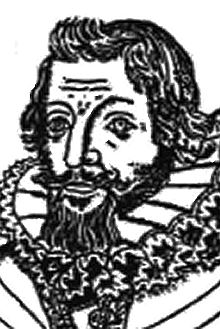Robert Filmer
Robert Filmer (* c. 1588 ; † May 26, 1653 in East Sutton , Kent ) was an English political theorist and during the English Civil War the most important English representative of the absolute divine right of the English monarchy . In posterity mainly remained John Locke's refutation Two Treatises Of Government remembered that emerged as a rejoinder to filmmaker political views.
life and work
Sir Edward Filmer's son studied at Trinity College , Cambridge , from 1604 and, like his family, was a staunch supporter of Charles I. The New Model Army allegedly plundered the family estate ten times during the Civil War.
In 1648 Filmer decided to publish his first writings in favor of the king in conflict with parliament. In his writings, the Bible forms the basis of his argument, from which he deduces the right of kings to rule over their subjects . At the beginning of world history, it is well known that God gave Adam authority over all his descendants. Noah inherited this authority from Adam. Filmer then refers to the tradition that Noah transferred the three continents of the then known world (Europe, Asia, Africa) to his sons Sem , Ham and Jafet while crossing the Mediterranean . These in turn passed on the right to rule over descendants and servants to their descendants, to which it finally passed to the rulers in Filmer's time. Power is therefore God-given and absolute.
Filmer solves the problem that a man comes to power through the unfathomable will of God without being a descendant of Noah by stating that what matters is not primarily the physical relationship to the king, but rather the fact that someone has absolute power has to be a God-given natural law . The king is not subject to any human control. He is not bound by the words and deeds of his ancestors, for whom he is not responsible, but by his own, since it is impossible for a person to pronounce a law about himself: laws must be given by other people than those who make them follow. Regarding the English constitution, he wrote in Freeholders Grand Inquest touching our Sovereign Lord the King and his Parliament in 1648 that the lords only advise the king and the commons only give their approval to the parliamentary acts, while the king is the sole source of laws. For filmmakers it was inconceivable that people would judge or even remove the king because they would then be judges of their own law.
For a full summary, see Patriarcha, or the Natural Power of Kings . The work was not published until 1680, more than 20 years after Filmer's death. Locke's reply referred to this book.
Fonts
- Robert Filmer: Patriarcha. Editor Peter Schröder, Philosophical Library, Felix Meiner 2019
Web links
- Robert Filmer , Digitizations on Post-Reformation Digital Library
| personal data | |
|---|---|
| SURNAME | Filmer, Robert |
| BRIEF DESCRIPTION | English political theorist |
| DATE OF BIRTH | 1588 |
| PLACE OF BIRTH | East Sutton , Kent |
| DATE OF DEATH | May 26, 1653 |
| Place of death | East Sutton , Kent |
